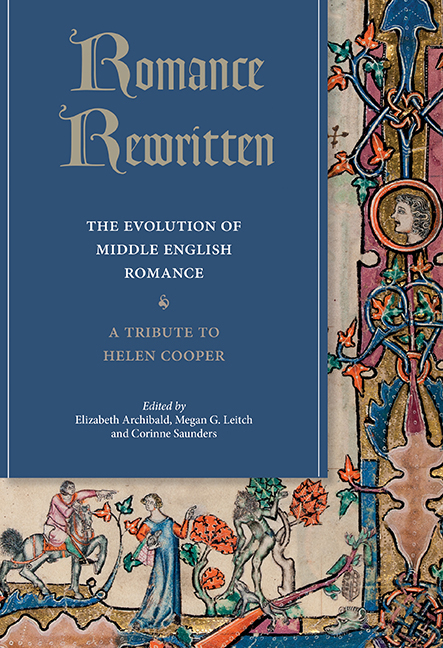Book contents
- Frontmatter
- Dedication
- Contents
- Notes on Contributors
- Acknowledgements
- Introduction. Middle English Romance: The Motifs and the Critics
- I Romance Disruptions
- 1 Medieval Romance Mischief
- 2 Rewriting Chivalric Encounters: Cultural Anxieties and Social Critique in the Fourteenth Century
- 3 Malory's Comedy
- II Romance and Narrative Strategies
- III Romance and Spiritual Priorities
- IV Late Romance
- Works Cited
- Index
- Volumes Already Published
3 - Malory's Comedy
from I - Romance Disruptions
Published online by Cambridge University Press: 17 October 2019
- Frontmatter
- Dedication
- Contents
- Notes on Contributors
- Acknowledgements
- Introduction. Middle English Romance: The Motifs and the Critics
- I Romance Disruptions
- 1 Medieval Romance Mischief
- 2 Rewriting Chivalric Encounters: Cultural Anxieties and Social Critique in the Fourteenth Century
- 3 Malory's Comedy
- II Romance and Narrative Strategies
- III Romance and Spiritual Priorities
- IV Late Romance
- Works Cited
- Index
- Volumes Already Published
Summary
We do not tend to read Karl Marx for his theory of comedy, but to say, as he did, that ‘all facts and personages of great importance in world history occur, as it were, twice … the first time as tragedy, the second as farce’ is to make the interesting presumption that comedy and tragedy are twinned. This is an optimistic vision of historical change of course, and though we do not tend to look to Marx for his optimism either, he could laugh at political disaster because he was sure that even the most troubled times were hurrying the state toward utopia. George Meredith also embraced the theory that comedy is really the converse of tragedy, although, interestingly enough, he reversed the sequence, imagining the end of comedy as ‘the commencement of a tragedy, were the curtain to rise again on the performers’. The picture he evokes is of, say, Mr Darcy and Elizabeth on their wedding morning, not simply as they have to convert the sparring that their wooing consisted of into a form of life, but as they must also avoid the wreckage of the bad marriage choices ranged round them in Pride and Prejudice. Mr Bennett's anxiety over Elizabeth's choice even after she has made it (‘let me not have the grief of seeing you unable to respect your partner in life’) is the most explicit acknowledgment Jane Austen allows of the tragedy that she has already portrayed in the marriage of Elizabeth's parents. What Elizabeth and Darcy must overcome in order to remain in the genre of romance is what Pride and Prejudice wisely knows but also emphatically refuses to be about.
Nevertheless, theories of comedy might seem to have very little to say about a text so strongly committed to tragic trajectories that both the title and subject of its last book, ‘The Most Piteous Tale of the Morte Arthur Saunz Guerdon’, have long functioned as a synecdoche for the whole. The knights in the tragic course of Thomas Malory's Morte Darthur do manage to laugh now and then, and, as a number of studies have emphasised in recent decades, there are even eruptions of ‘low-comic situational humor’, particularly in the ‘Book of Sir Tristram De Lyones’ and the ‘Book of Sir Launcelot and Queen Guinevere’.
- Type
- Chapter
- Information
- Romance RewrittenThe Evolution of Middle English Romance. A Tribute to Helen Cooper, pp. 67 - 82Publisher: Boydell & BrewerPrint publication year: 2018

